Business & Management
17 Government Fisheries officials skilled on Bio-Economics of Fisheries Management
Published
3 years agoon
By
Jane Anyango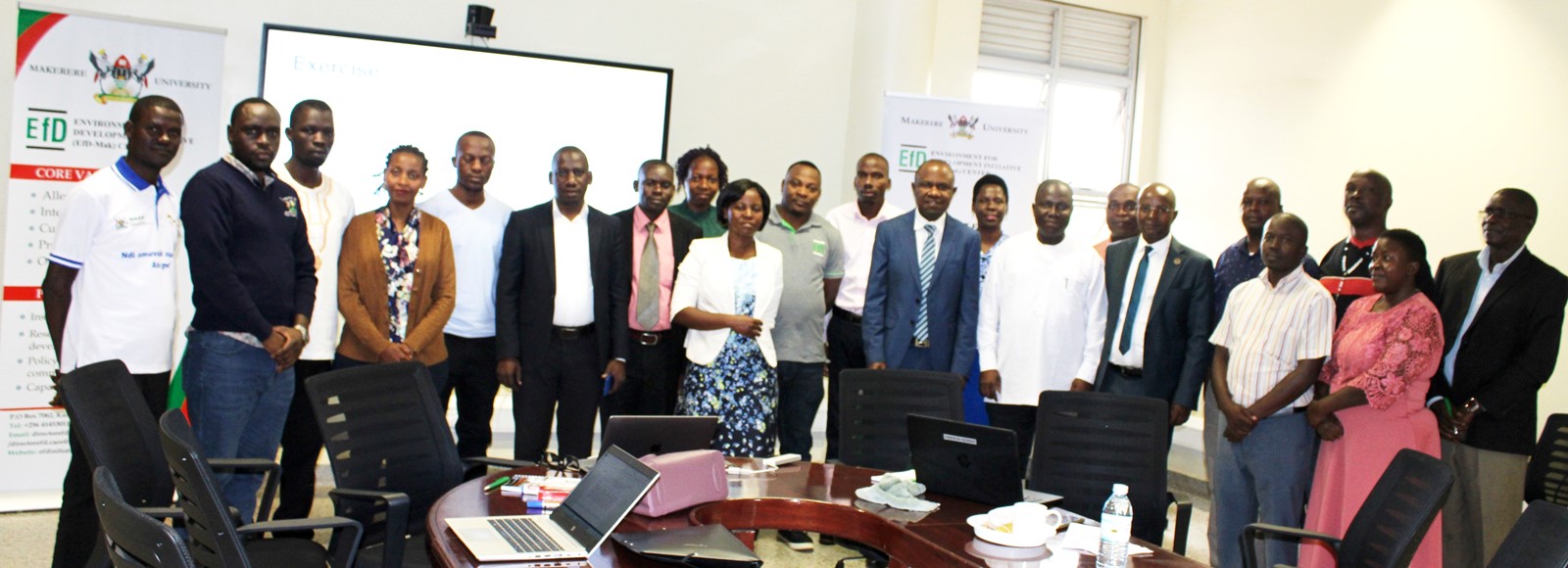
Seventeen (17) fisheries experts from the Uganda’s districts of Kampala, Mukono, Masaka. Wakiso and Jinja have been retooled on the bio-economics of fisheries management . The two days training (15th-16th March 2023) held at Makerere University was facilitated by Africa’s and Ghanaian renowned Professor of environmental economics, Wisdom Akpalu.
Prof. Wisdom was invited by the EfD-Mak centre to come and provide training on bio-economics of fisheries management to fisheries officers in Uganda. Prof. Wisdom is the centre Director of EfD Ghana but also the member of the coordination committee of the entire EfD Network and member of the capacity development committee of the EfD Network but also, the leader of the Blue resources for development- a collaborative program within the EfD Network where fisheries fall.
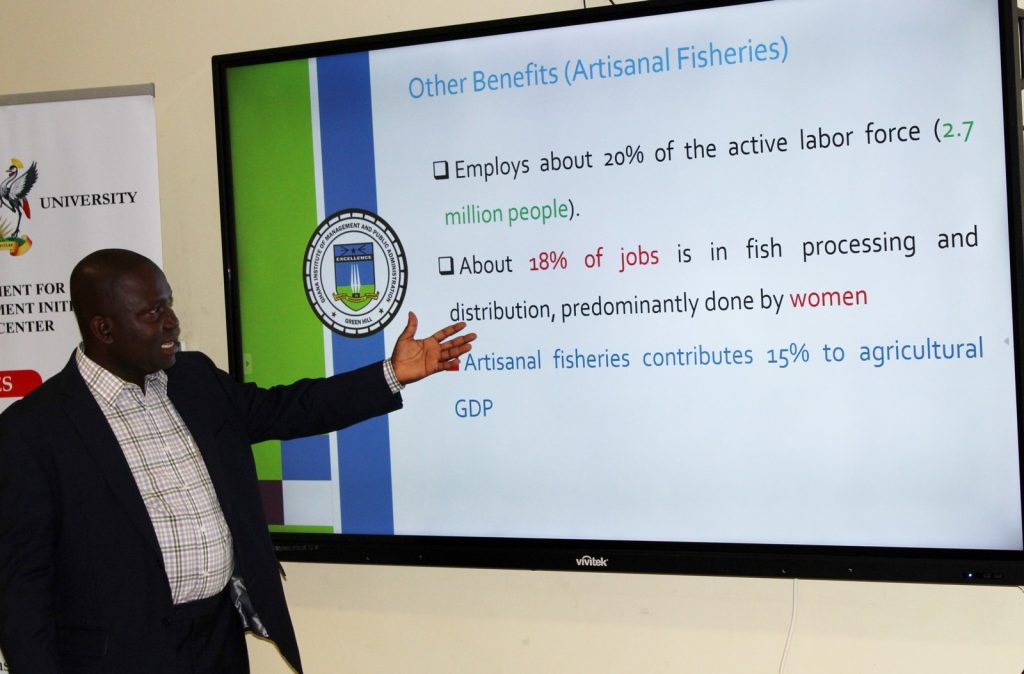
Government fisheries officials were retooled on different aspects including the cost, revenue and profit in fisheries economics, growth functions in fisheries, property rights and resources extraction, policy instruments to regulate overfishing. Other aspects were dynamic equilibrium and the concept of shadow value, destructive fishing practices, resource use externalities and the performance of capture fisheries in Africa.
The training was officially opened by the Principal College of Business and Management Sciences Assoc. Prof. Eria Hisali who congratulated the centre Director for organizing this training and other initiatives adding that, they are important because they add to our visibility as a a college and university and it also takes us to the government and other agencies out there.
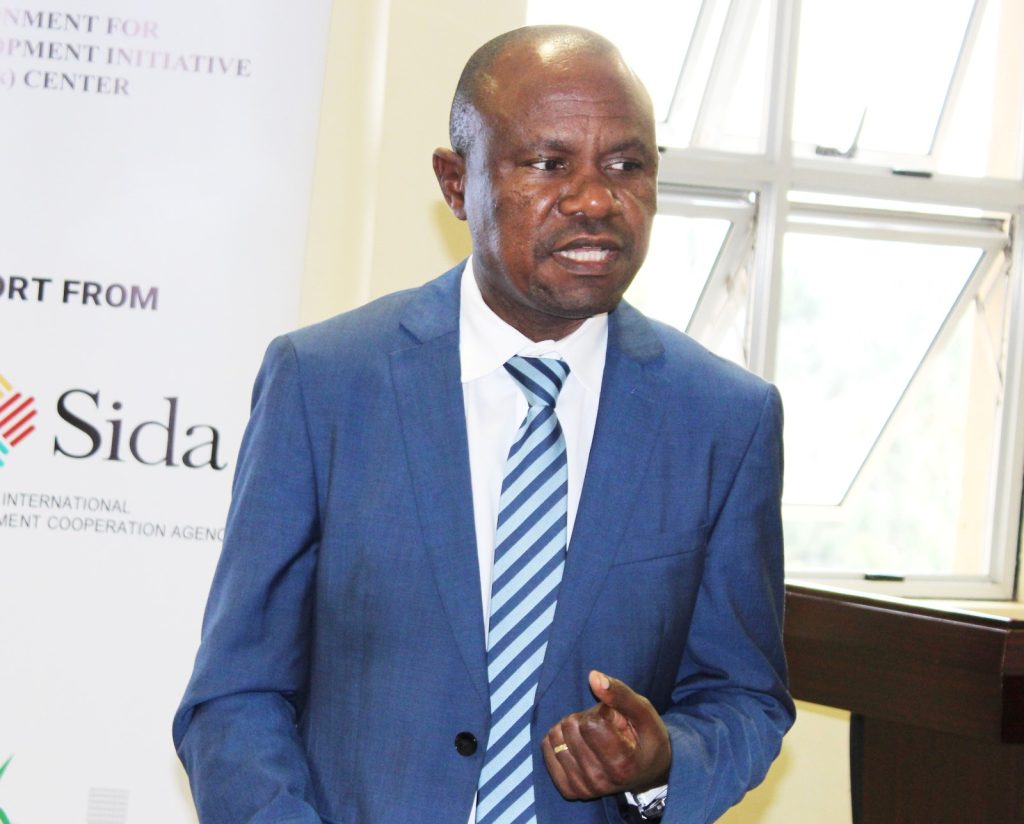
Prof. Hisali noted that Fisheries and fish related products are among and still remain among the five leading exports from Uganda while Africa is one of the two continents where the big proportion of the population still lives directly of the fishing activities and Natural resources in general.
“Our concern then, is the way these activities are being undertaken is not sustainable we risk depleting these resources because of population pressure, and unsustainable practices and once that happens it threatens our existence of our continent but also as countries because if we deplete resources and yet we are living directly of the same, then everyone should be starting to imagine what will happen.
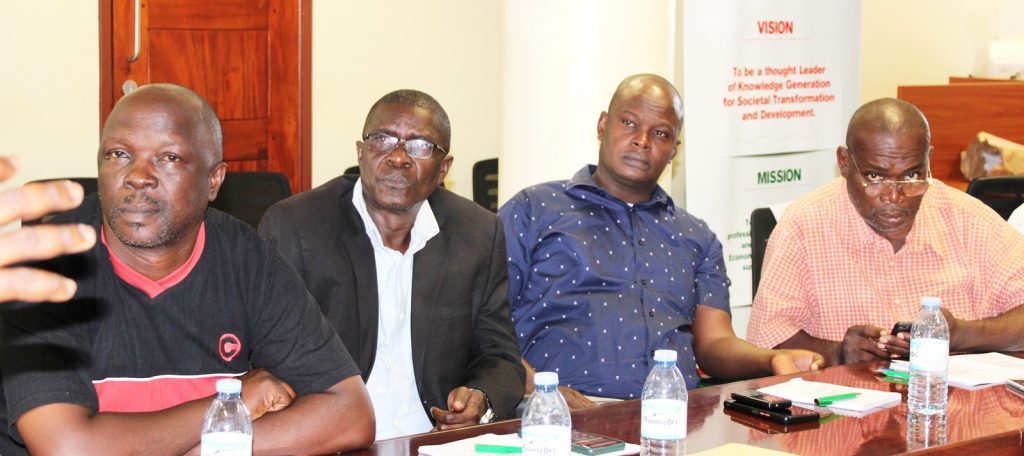
What will happen is untold suffering but also direct conflict for the little resources that would have remained and disintegration of countries and societies” he decried
The Principal challenged all participants to look at the strategic importance of the lessons to be undertaken in the two days
“This intervention that the center is undertaking to share insights on how best we can sustainably use these resources becomes very important for the very survival of our countries. I want you to look at this training as a very important one because it speaks of the very basis of our survival as a country and continent”, Prof. Hisali stressed.
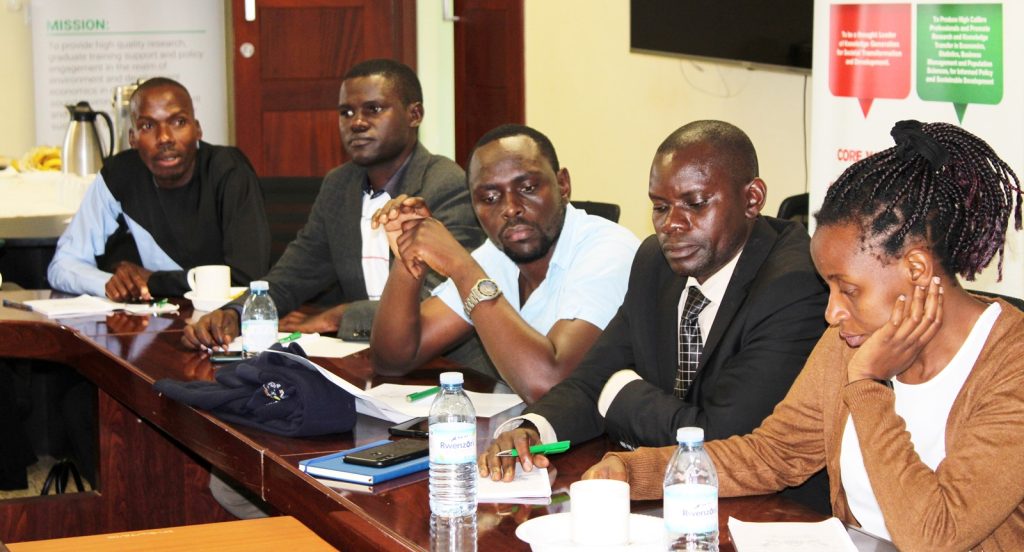
Prof. Hisali advised participants to form a network which should go deeper into ideas given by Prof. Wisdom, contextualize them and ensure they are fully applicable to the Ugandan situation and begin influencing sustainable practices and policy.
“Some civil servants at your level tend to under look themselves. You are extremely powerful and you can influence so many things. So go with that confidence and come up with suggestions that are practical, make sense and that can be implemented.
As a university and specifically the center, Hisali pledged full availability to work closely with the fisheries experts and to convene in case they have ideas to work through the nitty gritties and contribute own insights .Prof. Hisali also pledged that the university will equally be available in terms of creating platforms for the works that fisheries experts do to engage wth policy makers.
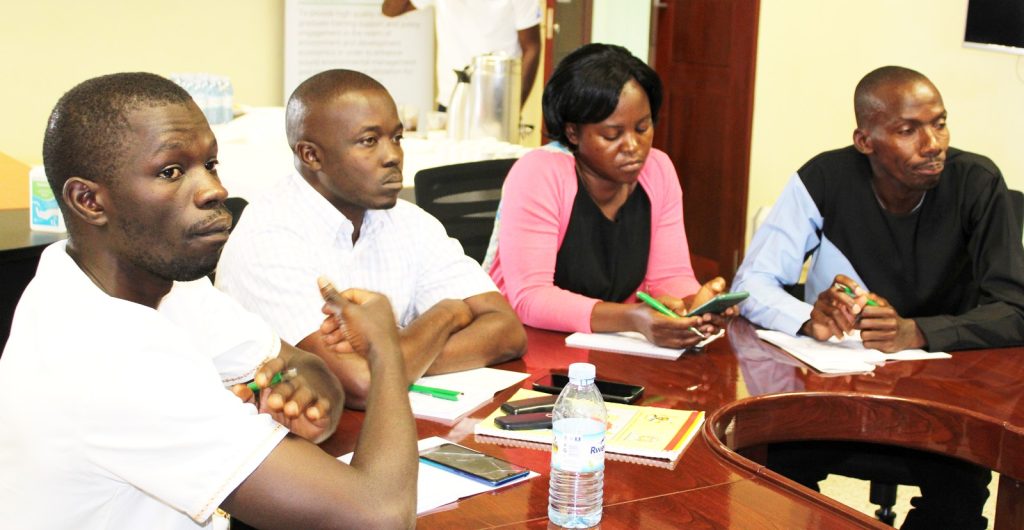
As they integrate lessons and experiences and insights, and as they develop materials for policy advocacy, the principal implored participants to get back to working places and pass on the message to build capacity in institution to have a critical mass of public servants and members of the community who have a different perspective on the way of handling natural resources and understanding the implications of mismanagement of resources.
“History will judge extremely harshly if we don’t take the necessary actions today to ensure that the next generation of the people in our continent live a better and more meaningful life”
The Principal thanked Prof. Wisdom Akpalu for making time to come to Uganda and Makerere University in particular to share the knowledge, skills and experiences from Ghana, expressing the need for opening up to share cross country comparisons to learn from one another on the basis of areas with commonalities.
Knowledge on the biology and economics of fisheries management critical for practitioners.
Prof. Wisdom Akpalu observed that Africa has very few people who have the expertise in combining the biology and economics of fisheries management which has made fisheries management difficult and unattractive because decision makers usually want to hear about money, stocks have declined, how to improve stocks and how much can be got if stocks are improved, the social economic implications when stocks are improved and cost involved.
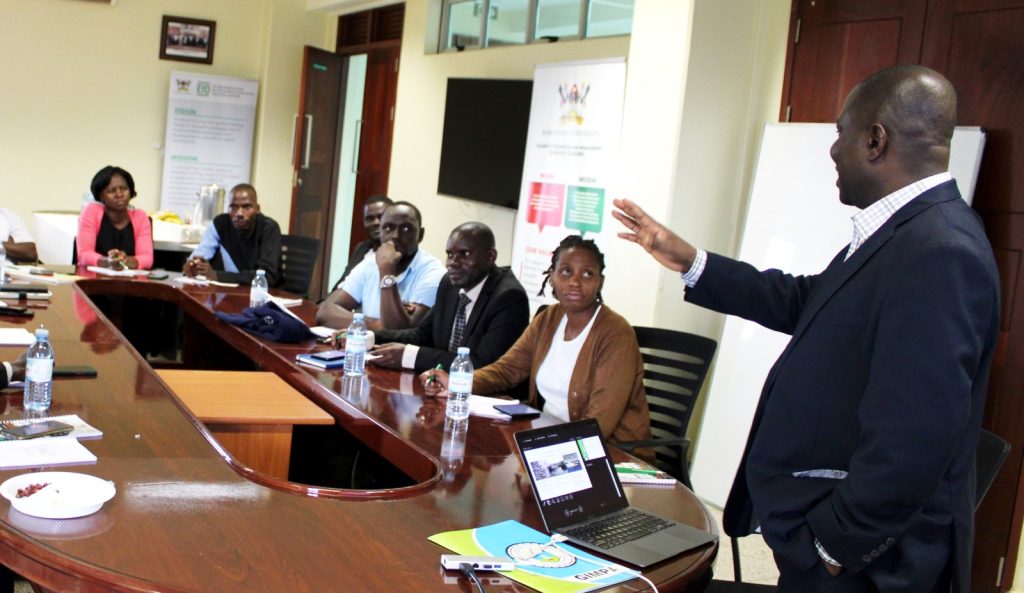
So, by bringing the biology and economics together one is able to paint a much better picture that is more appreciated by policy makers.
“The message is clear. We cannot manage what do not know. We cannot manage if we do not have some level of technical knowledge of how the fisheries operate and it is not sufficient to just have knowledge of the biology of fish the size, movement etc”, Wisdom stated.
Wisdom described Fisheries as an interesting area because it has so many dimensions that requires one to understand both the biology that is, how the fish grows, the thresholds in nature that you cannot harvest beyond a certain threshold or else the stock can collapse. And then you have to add the dimension of economics that when these fishes are harvested, they are harvested for economic and social reasons, as a source of food and also sold in the market that brings in the issue of cost, revenue and how does these influence the way we manage the resource.
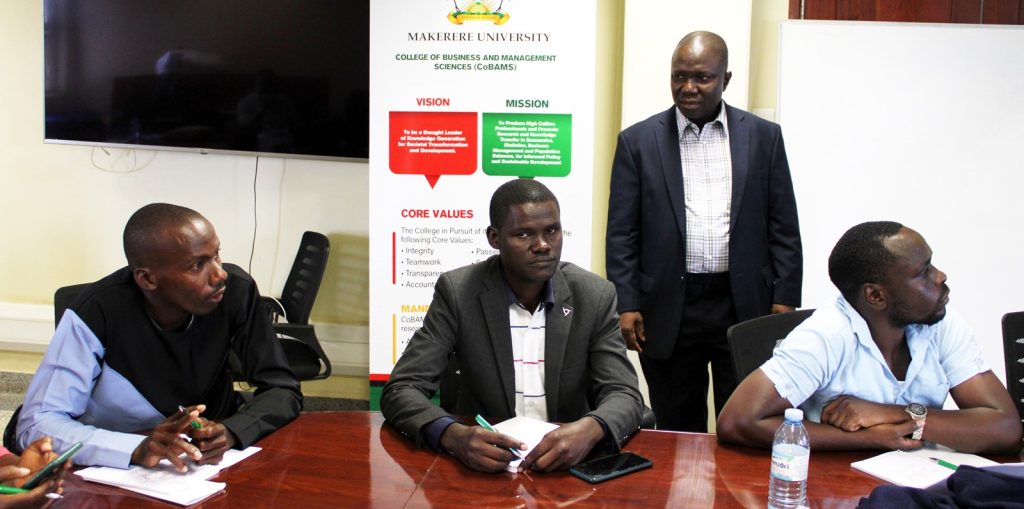
“By providing them this knowledge, they now have a better sense of how to bring the knowledge in the biology and economics together to distinguish between concepts such as maximum sustainable yield which is the maximum quantity of fish that we can catch on a yearly basis and maximum economic yield which is the quantity to catch to generate the highest economic benefit.
Usually, the maximum economic yield may be lower than the maximum sustainable yield which means to make a lot of money, or to make the highest possible profit from the fisheries, you may have to deploy a lesser level of effort than you are aiming to catch the maxim you can catch on a yearly basis for society to consume”. The professor explained.
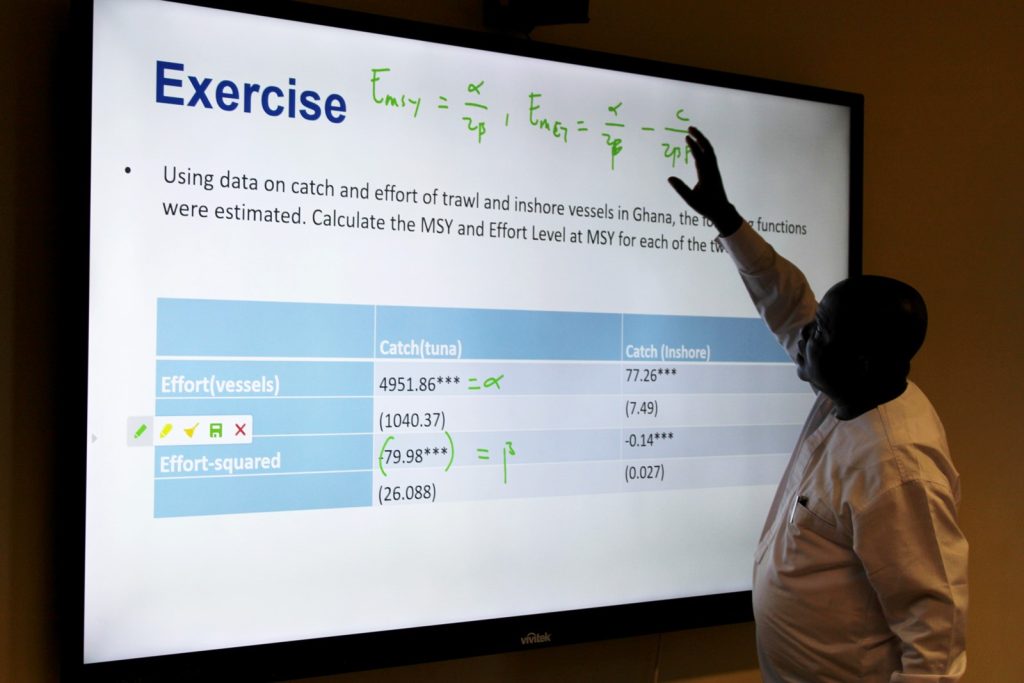
He further explained that sometimes the biology will recommend catching up to maxim yield but, the economics may recommend to restrict the catch because when you catch all, the profits you make is lower. If you reduce the catch at a lower level, other things have to come in, the social consideration, whether fishing for profit or other reason and how to incorporate those reasons in the basic model so as to appreciate things beyond economic gains or pure profits from economics.
Prof. Wisdom commended the participants for the active participation and ability to grasp the subject matter.
“I have been quite impressed. When I was coming, I knew they were going to be faculty graduate students etc. Only to see practitioners, people who were in the field doing fisheries work . I was wondering whether they are a cut for a course like this. But to my surprise, with all the concepts that I had to go through they were very comfortable.
“They showed the clear understanding of the concept and they were looking for more and when I gave exercises they did it clearly and gave me the answers. It has been quiet impressive and it shows that they have potential and the zeal, they have the interest and they will put what they have learnt to practice”. He appreciated.
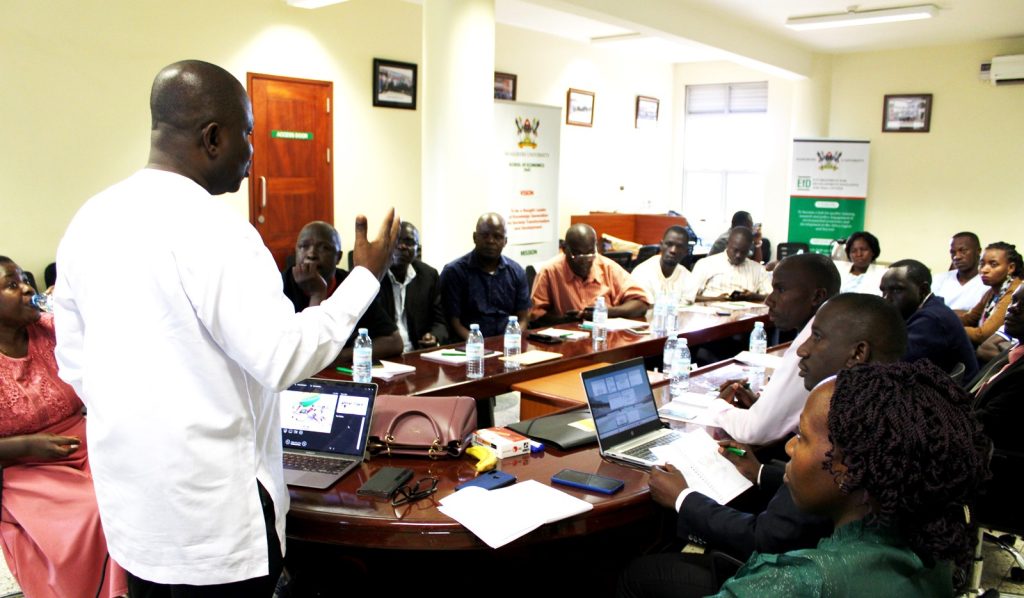
Prof. Wisdom encourage the university to continue with this type of collaboration adding that the EfD Network within the continent has a lot expertise and potential that can be harnessed for the benefit of individual countries and the continent.
“With this type of interaction we share knowledge and sometimes we tend to undervalue this knowledge that we share but I believe that if we have to change things for better for the continent, we have to begin to make use of our expertise and experiences in a platform like this.
Today, it is bio-economics of fisheries management and next time it should be something also relevant for the continent This was a very good positive initiative, I applaud the university and encourage them to continue” He said.
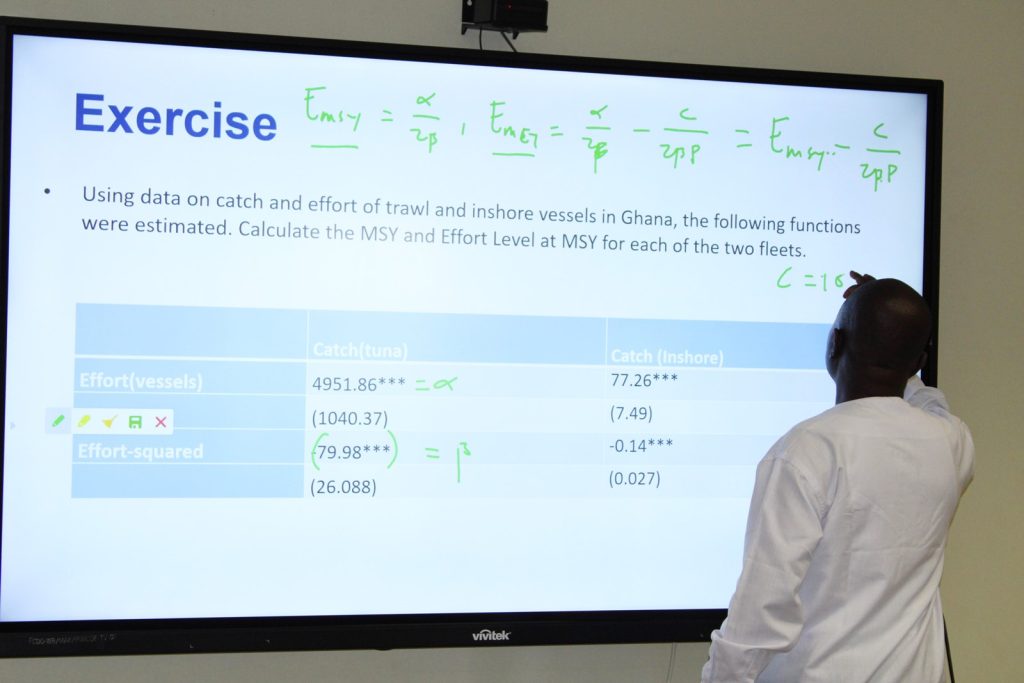
Namaganda Ruth, the Fisheries officer from Mukono District Local Government said:
“The training was very productive to me in that being on the frontline of managing the fisheries, it gives you a clear picture of how you can predict and advise fishermen as the primary beneficiaries of the resource. At the district level, when policies are being developed, we can guide the technical officers, our superiors and politicians on how to effectively manage the resources.
If possible, the centre should organize more training in other aspects of natural resources because management is so diverse”.
Maganda Moses is the Senior Environmental Officer from Jinja District Local Government. He said:
“The training was very good. Much of what we are missing in government is attaching an economic value to what we do. We do not have those basics of making those estimates and calculations. But at least now, I have an idea of what I can do in case they need such information or data. The training was on how we can collect data on a particular resource of the fisheries sector.
So it was a very good training only that the training period of two days was inadequate and probably and we need further training in that, and even those who did not benefit from this, it would be good to introduce them to such training so that they are equipped with skills of generating data in the fisheries sector”.
Importance of the Fisheries sector
Fisheries according to Prof. Wisdom plays a key role in our social economic social being world over and on the continent. In Ghana, for example about 60% of the animal protein needed comes from fisheries and this because the other types of animal protein are either unavailable, scarce or expensive. So a lot of people derive that requirement from fish.
The same applies in Uganda, where people would have loved to eat fish but because fish is not readily available. So that fact that we have less than 10% of animal protein from fish, is not that people do not like fish but because it is outside the reach of the majority of people.
On the other hand, Wisdom asserts that fisheries are resources that if properly managed they can last forever but then these fisheries are over capitalized and over fished in Ghana and Uganda. So, the fisheries sector is extremely important for job create employing a huge number of the population, giving animal protein requirement,.
“Fisheries products provides foreign exchange because a lot of money is spent through foreign exchange in Uganda through Nile perch processing and export .So the sector is critical and beyond just being important even the value alone to the fish that is harvested is about 2.1% of the Ugandan GDP and that is why it was important for the government officials to be retooled”. Prof. Wisdom explained.
Key issues affecting the fisheries sector
Prof. Wisdom noted that the fisheries sector both in Ghana and Uganda are troubled with so many challenges . One of those is over-capitalization where there are too many vessels, canoes, boats and that has to be reduced. There is also lack of proper management and so much competition for stocks from different sub-sectors that is leading to over exploitation of stock.
There is use of all sorts of destructive methods because there is competition for stock as fisher men tend to think that they can use other illegal means to be able to catch more fish. Some use explosive dynamites, small size nets, small filament nets which are all over the places posing a serious challenge within the industry.
But most importantly there is lack of knowledge and capacity to be able to appreciate the impact of all problems on the stocks, harvest, profits and gains that generated from these resources.
Key policy interventions Uganda can emulate from Ghana
From the discussions and interactions with the fisheries experts, Prof. Wisdom noted that Ghana and Uganda it appears have similar challenges including over capacity in the fishing activities taking place, low political and foreign interests in the fisheries sector with foreigners coming in to compete with locals.
In Ghana, Wisdom said, there are areas dedicated to small scale fishing and the aim is to secure livelihoods of poor people living along coastal communities, with specific marked spaces that are reserved for local fishermen so that they can have some catch.
Uganda can learn that Ghana has demarcated where and what locals and foreigners can fish.
“We should also priorities local fishermen viz-a-viz foreign vessels and if possible impose enough taxes on the foreign vessels and use those taxes to take care of local fishermen. We realized that we can gain efficiency by allowing foreign vessels to fish species that local people find difficult to catch and make sure we get taxes that can support local fishing industry so that local fishermen are not denied their basic livelihoods.
Ghana according Prof. Wisdom has clauses and policies where within specific areas fishermen are not supposed to fish to allow the stocks to recover. From the discussion with the fisheries officials, Uganda also did it once or twice but has not done it for some time. It is time for Uganda to revisit and try to implement this policies because there are clear ecological benefits and improvement in catches of fisher folks.
Although Uganda has marine police like in Ghana, Ghana in addition has other established local institutions. There is what is called, “landing beach enforcement committee” where local people constitute themselves into enforcement units and they are able to control some of the illegal practices about fisher folks that Uganda can learn from.
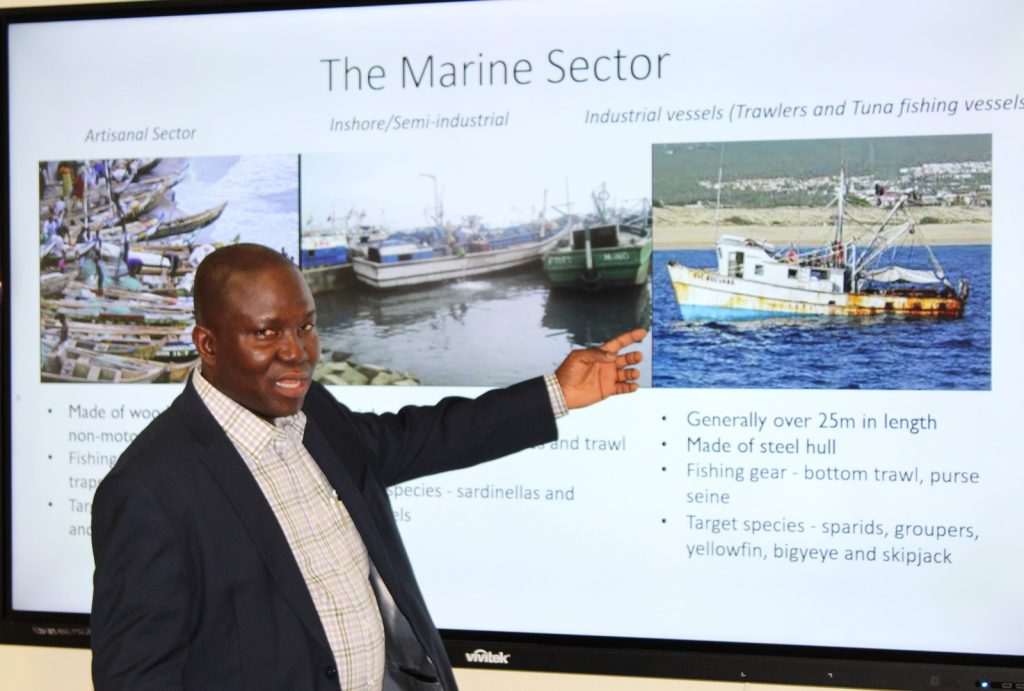
Ghana as explained by Prof. Wisdom has a strong collaboration between research, academia and policy makers working at the ministries and then, the stakeholders the fisher folks and civil society organizations. That platform he advised should be encouraged to be created so that it will not be one sided decision, it will be a platform where researchers, fisher folks, civil society organizations and the ministries can always come together to discuss issues of common interest.
Ghana has also established the scientific and technical committee of the Fisheries commission compromising stakeholders such as people from academia who identify and investigate issues for discussion and advise the commission to implement issues observed and Uganda can learn from this.
In Ghana’s fishing communities, there is what they call, “the fish queens or mummies”. These are women who take key roles in post-harvest activities and the fish queen is the leader of women engaged in fish processing and trading and typically, they are the ones who determine the pricing of fish. When the fisher folks come from the sea, they observe the catches of a few vessels like the first three canoes and are able to tell what the supply of the day would be and that guides them to determine the price per measure would be and they announce that price and every fisherman that comes has to sell at that price. So they play that key role of determining the price of fish and all fishermen on that day obey that particular price.
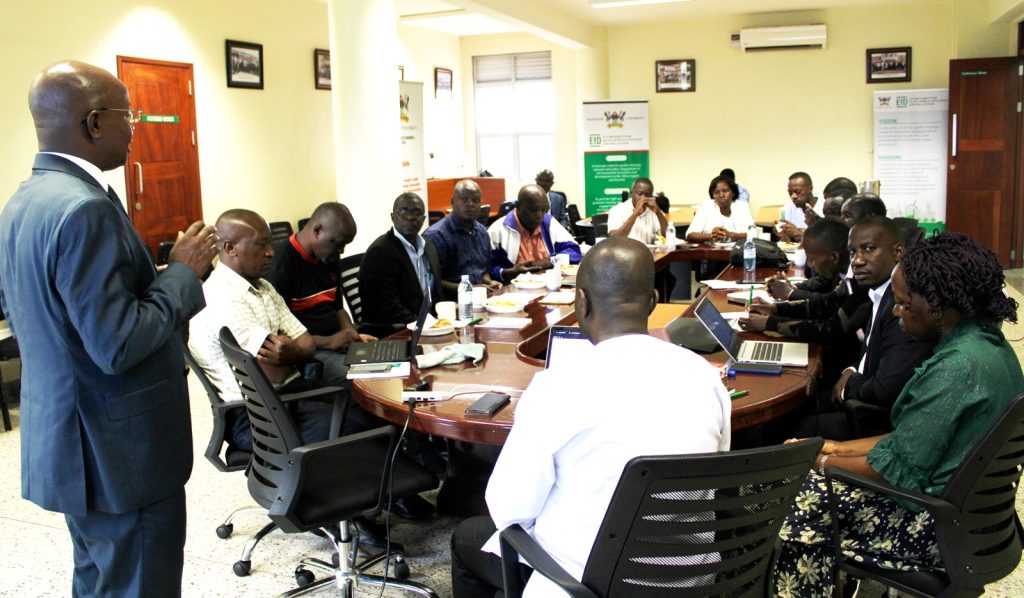
In Ghana, the fisheries industry especially the artisanal vessels are supposed to be Ghanaian. The semi-industrial vessels are also supposed to be owned by Ghanaians and including industrial trawlers are also supposed to be owned by Ghanaians. But because the Ghanaian don’t have the capacity to own the trawlers, they go into a hire purchase agreement and the agreement tends to be rooted in corruption. Those who claim to have hired the vessels do it on behalf of foreigners who disguise as experts on how to manage vessels but are the true beneficiaries. At the end of the day they end up catching the fish they are not supposed to and make a lot of money. So there are Vessel Monitoring Systems that are installed on vessels to monitor and track them and to know where exactly they are operating.
Prof. Wisdom says he has been recommending installation of video devices so that the activities can be watched at a distance so that they can be regulated better and avoid exploitation. By installing video devices on boats and vessels that target big species like the Nile perch to monitor them, the benefits cost will be 21 to 1.
Remarks by the Director EfD-Mak centre
Prof. Edward Bbaale welcomed participants to Makarere University and the EfD Centre. In a special way, Prof. Bbaale thanked the visiting professor for moving all the way from Ghana to come and facilitate the workshop.
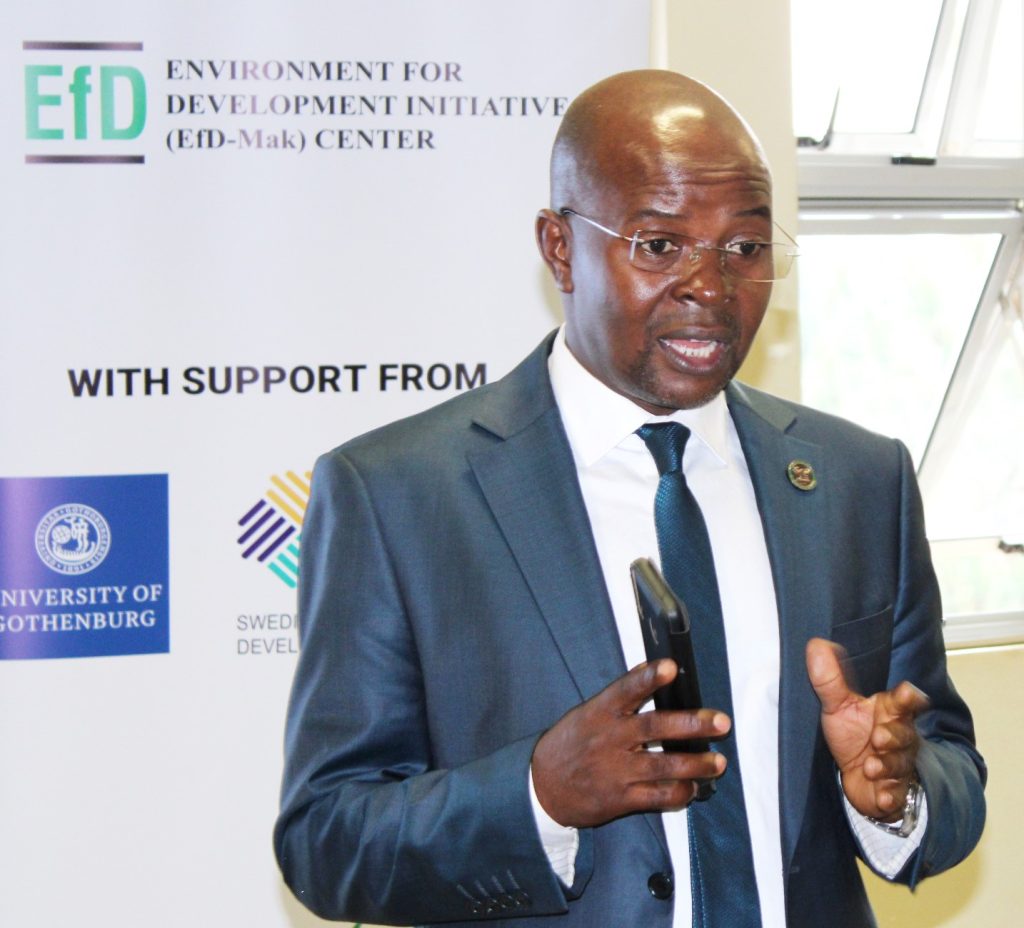
Bbaale also extended appreciation to the university management and the Principal CoBAMS for facilitating and overseeing the center’s operations.
He thanked participants for making time to come to Makerere saying, they were selected because they were instrumental in their duty station assuring them that the training will focus on what they do at their places of work.
Prof. Bbaale assured participants that none of the participants was selected by Makerere but letters were write to their bosses who selected them. He said by the end of the training, they would have changed the way they perceived things and the way they would want to go deeper into bio economics of fisheries management.
He assured participants that the facilitator is one of the best environmental economists in Africa.
“We have a person that has invested a lot of time in the work for which he is sharing with us. He has had a lot of experience working with international organizations before he came back to work with a university in Ghana and also to established the EfD centre in Ghana”
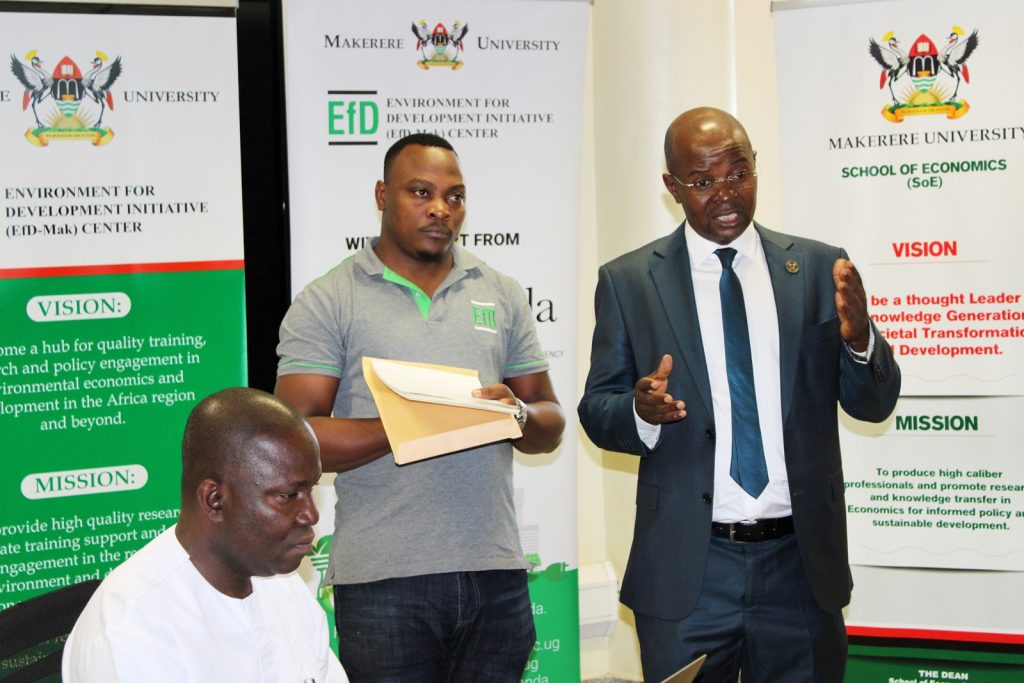
He thanked Prof. Wisdom for creating this collaboration saying, the center is developing capacity in different areas and would be glad to visit Ghana and share the experiences.
“Uganda is an agricultural country and the government officers you see here are very few compared to the need that we have, that means that may be another time we shall invite you for another cohort because here, are people from the ministry of agriculture, environmental police, and colleagues from different local governments from different districts. It means that to have lasting impact we must require that we have several rounds of this nature”, Bbaale added.
Prof. Wisdom Akpalu
Prof. Wisdom is the Centre Director of EfD Ghana but also the member of the coordination committee of the entire EfD Network and member of the capacity development committee of the EfD Network but importantly, the leader of the Blue resources for development- a collaborative program within the EfD Network where fisheries is. He obtained a PhD in economics from the University of Gothenburg Sweden 2006. He is currently Dean, of the School of Research and Graduate Studies at the Ghana Institute of Management and Public Administration. Prof Wisdom is also the President of the African Association of Environmental and Resource Economists in Africa. His research focuses on social economics of natural resource management including fisheries management, economics of crime and punishment and economic institutions.
You may like
-


Olivia Nakisita and the Quiet Urgency of Adolescent Refugee Health
-


Mastercard Foundation Scholars embrace and honour their rich cultural diversity
-
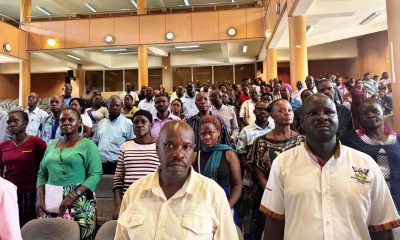

Support Staff Trained to Promote Safety of Students and Stakeholders
-
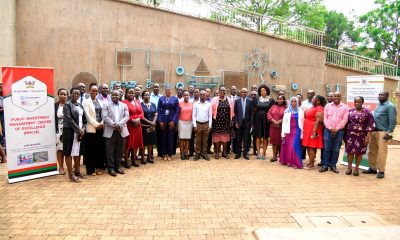

Makerere Hosts Second Cohort of MoKCC&MA Procurement Officers for E&S Safeguards Training
-
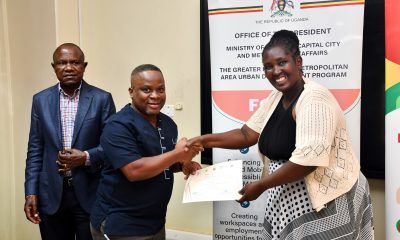

PIM Centre Awards Certificates to MoKCC&MA Officers after Safeguards Training
-


Makerere Launches Scholarly Guide, Calls for Increased Research, Publication and Innovation in Africa
Business & Management
Makerere Hosts Second Cohort of MoKCC&MA Procurement Officers for E&S Safeguards Training
Published
1 day agoon
February 18, 2026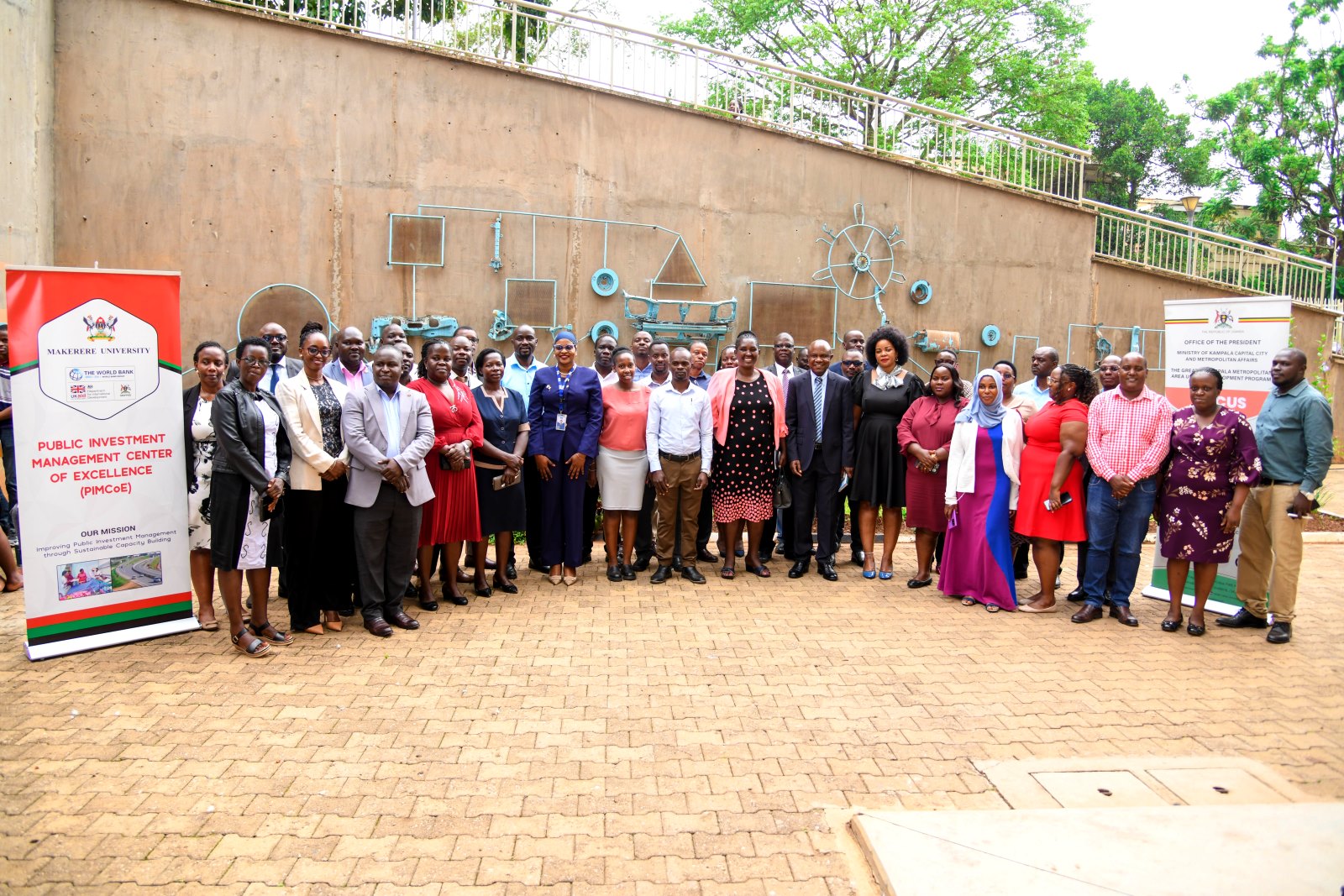
The second cohort of procurement and project officers from the Ministry of Kampala Capital City and Metropolitan Affairs (MoKCC&MA) has commenced a four-day training in Integrating Environmental and Social (E&S) Safeguards in the Procurement Cycle at Makerere University.
The training, which started on 17th February, is being conducted by the Public Investment Management (PIM) Centre of Excellence and brings together officers from Kampala Capital City Authority (KCCA), Entebbe Municipality, Kira Municipality, Mpigi District Local Government, and Wakiso District Local Government.
The programme was officially opened by the Under Secretary of MoKCC&MA, Ms. Monica Edemachu Ejua.
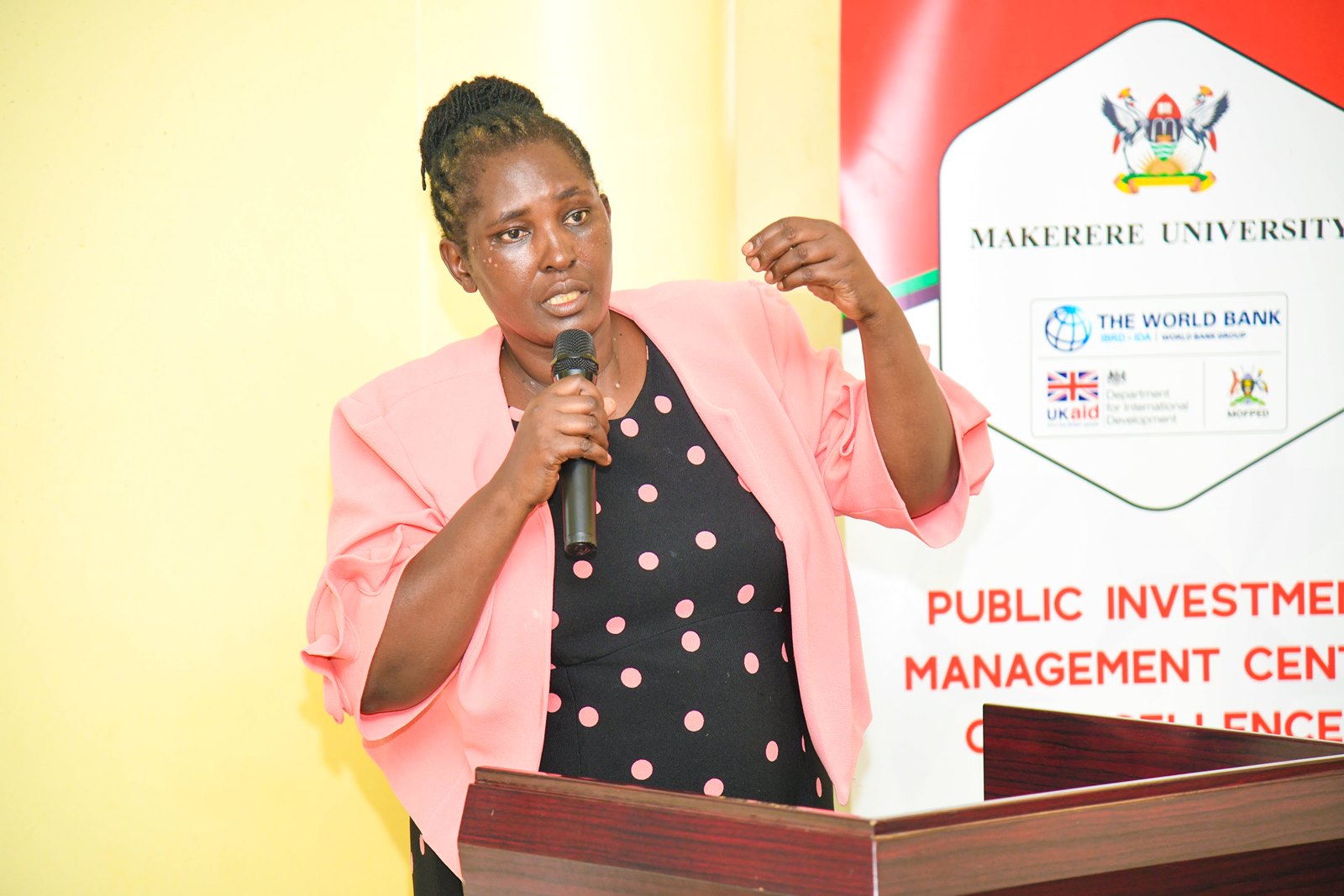
In her opening remarks, Ms. Ejua thanked Makerere University for strengthening the Ministry’s capacity and bringing on board facilitators with hands-on experience. She emphasized that the training is critical for effective implementation of the Greater Kampala Metropolitan Area Urban Development Programme (GKMA-UDP), which operates under a results-based financing framework.
Drawing from personal experience, she underscored the importance of mainstreaming environmental and social safeguards into government operations and even into school curricula. Using practical examples, from poor waste management practices to unsafe project sites—she highlighted the real-life consequences of weak compliance, including fatalities, environmental degradation, and social injustices.
She cited recent incidents within the GKMA programme, noting that failure to manage environmental and social risks can lead to suspension of project sites and reputational damage.
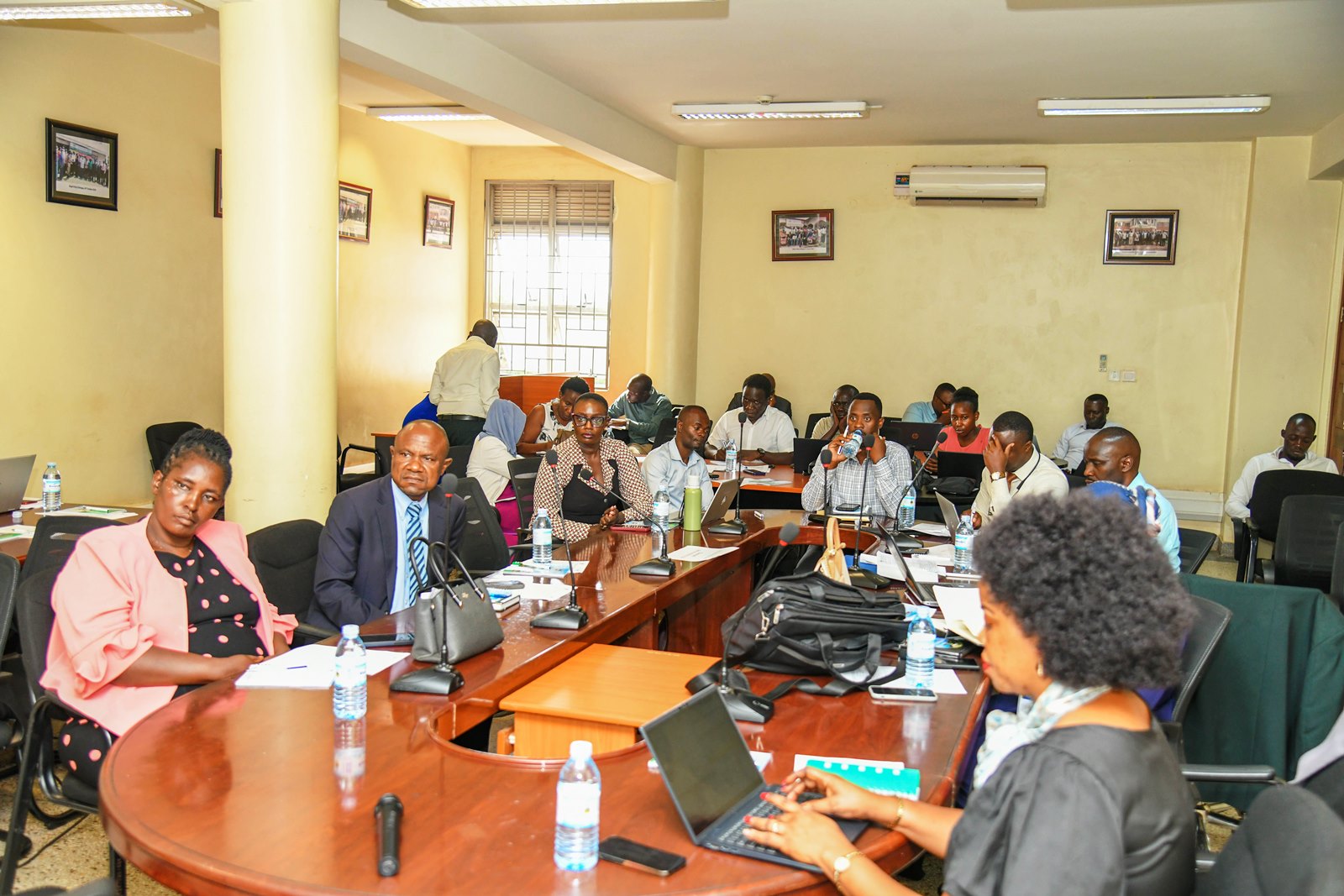
“We would rather prevent than deal with the death of somebody. Contractors know how expensive it is to deal with fatalities,” she stressed.
Ms. Ejua further challenged procurement professionals to recognize their central role in government performance.
“Procurement is the engine of government business. If it is not well managed from planning, the end result will be bad. But if we plan well, we shall end well,” she said.
She called for greater engagement with communities during project implementation and urged officers to become ambassadors of sustainable development beyond the classroom.
Strengthening the Public Investment Cycle
Welcoming participants, the Deputy Director of the PIM Centre of Excellence, Prof. Eria Hisali, emphasized that integrating environmental, social, health and safety considerations is as important as assessing financial and economic feasibility.
He noted that since 2009/2010, the Government of Uganda has allocated a significant share of its national budget—averaging 40–45 percent—towards capital development projects. Such large-scale investments, he said, demand robust systems to ensure value for money and sustainability across the entire public investment management cycle.
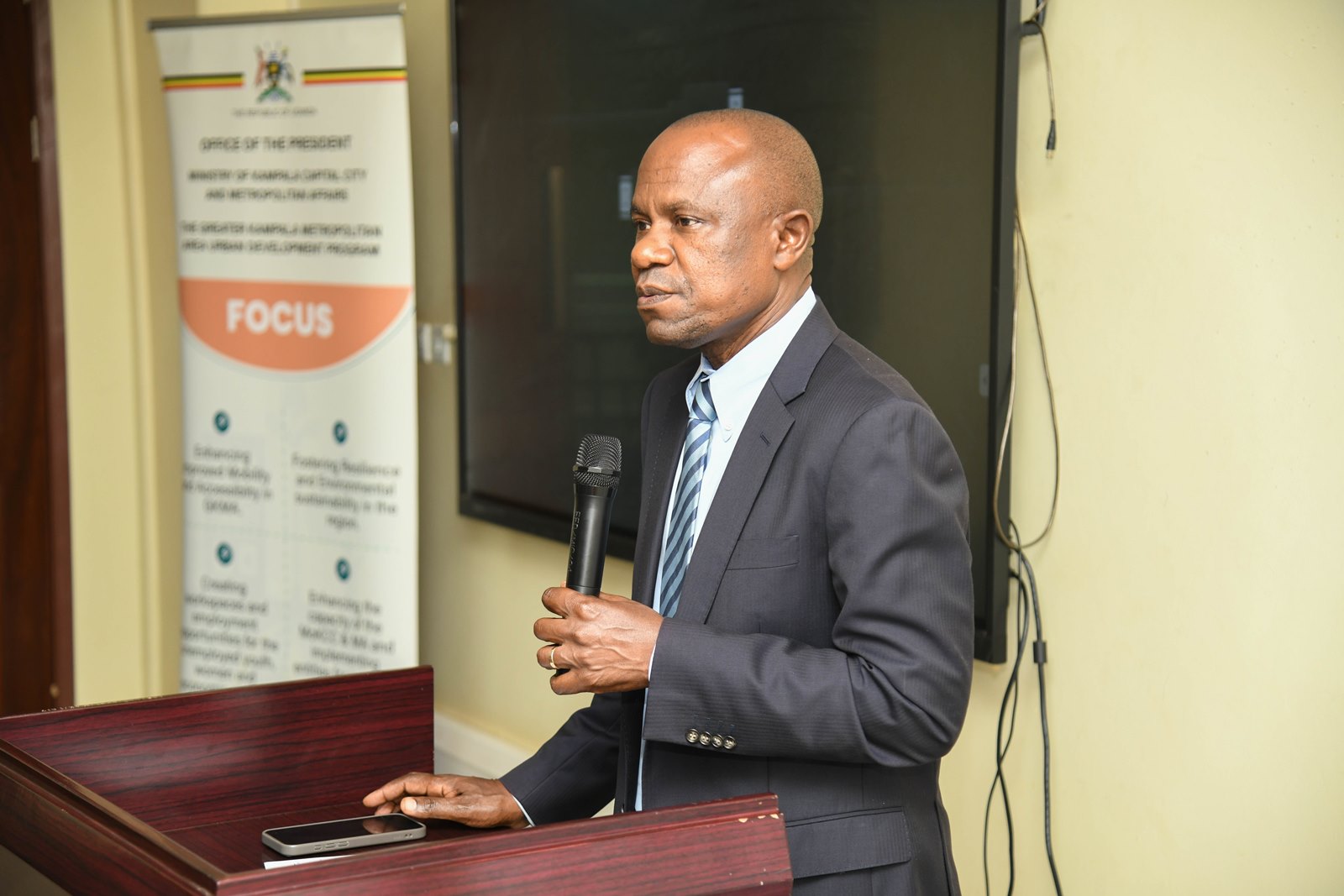
“Public investment management is not only about feasibility studies. It includes ideation, procurement, monitoring and evaluation, and sustainability considerations,” Prof. Hisali explained.
He encouraged participants to quantify the costs of non-compliance, including the economic implications of fatalities and environmental damage, arguing that evidence-based decision-making strengthens accountability and action.
World Bank Support and System Strengthening
Representing, the funding agency, Ms Maliam Acio Aalangdong, a Social Development Specialist from the World Bank, commitment to strengthening country systems for environmental and social risk management.
She revealed that Uganda’s World Bank portfolio currently stands at approximately USD 4.9 billion, making effective safeguards management a priority. She explained that projects are now governed under the Environmental and Social Framework (ESF), which places strong emphasis on integrating risk mitigation measures from project design through implementation.
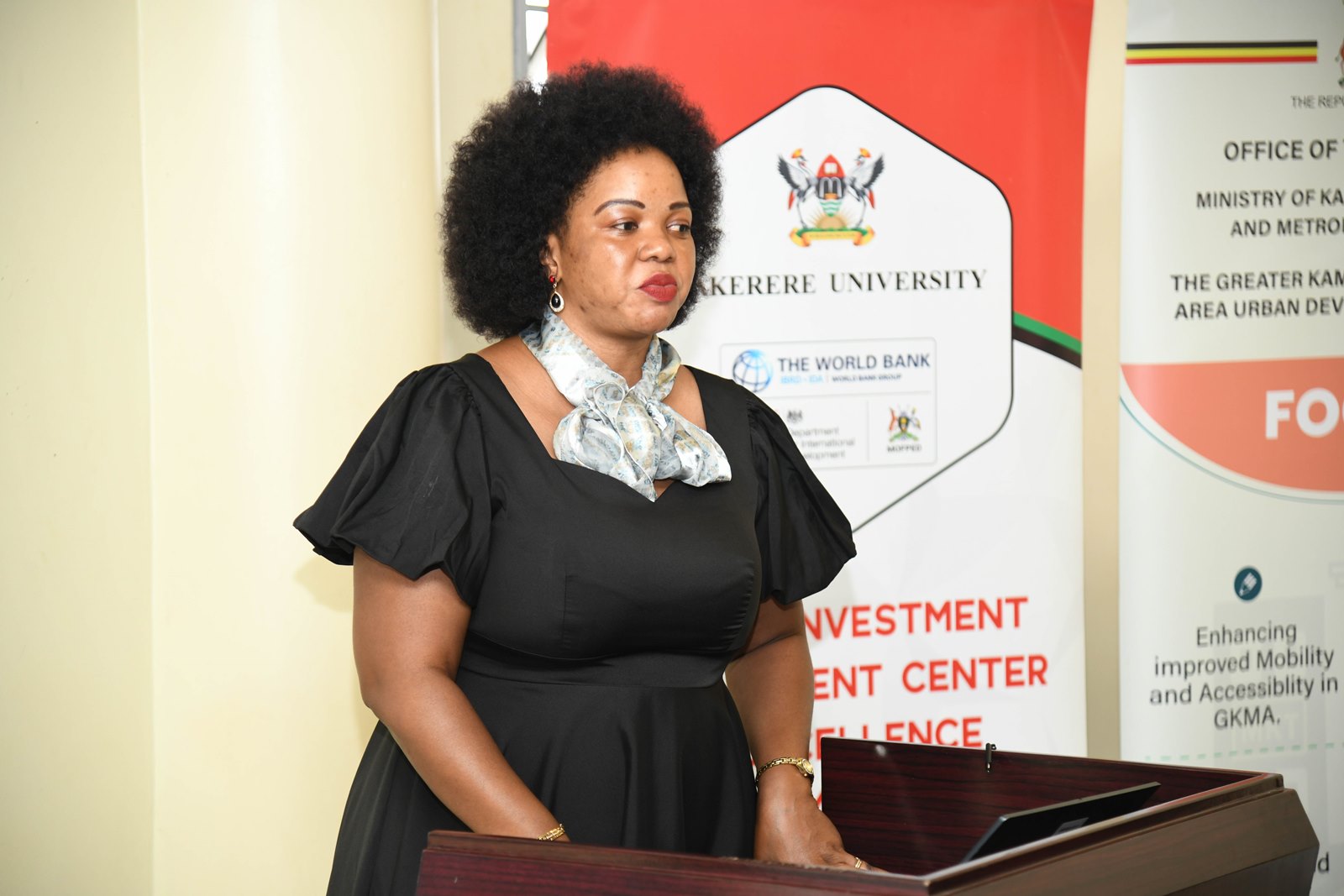
Ms. Acio noted that previous assessments identified gaps in upstream mainstreaming of E&S issues, stakeholder engagement, land acquisition management, and social risk coverage. The partnership with Makerere University and other institutions aims to address these gaps through structured training and professional development.
She also highlighted that fatalities recorded under some projects in Uganda—including six in a single year under GKMA—underscore the urgency of building stronger compliance and monitoring systems.
Training Objectives
Presenting the objectives of the training, Dr. Bruce Rukundo from MoKCC&MA explained that the programme focuses on strengthening participants’ ability to systematically integrate environmental, social, health and safety (ESHS) considerations into all stages of the procurement cycle.
Participants will be equipped to:
- Identify and map E&S risks during project planning and procurement;
- Draft and review bidding documents that reflect E&S obligations, including occupational safety, labour management, and gender-based violence safeguards;
- Apply objective criteria in bid evaluation to ensure compliance;
- Monitor contractor performance using inspections, checklists, and reporting tools;
- Take timely corrective action during project implementation.
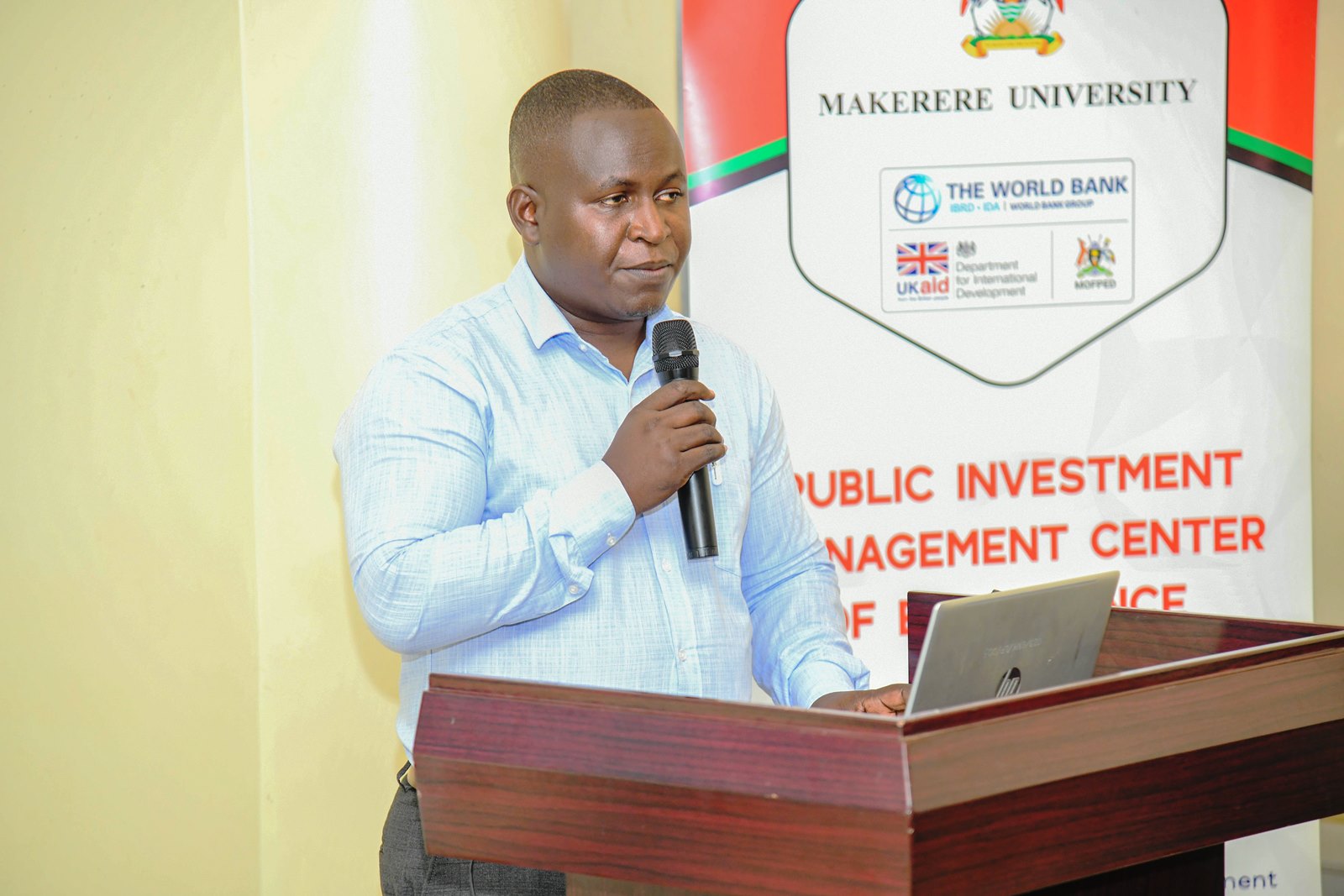
Dr. Rukundo emphasized that while contractors are responsible for compliance on site, the borrower remains ultimately accountable for managing environmental and social risks.
Expanding the Impact
Dr. Jude Mugarura, Lead Trainer, noted that the first cohort completed its training successfully the previous week. The second cohort expands participation to additional metropolitan entities, with an expected total of about 40 participants.
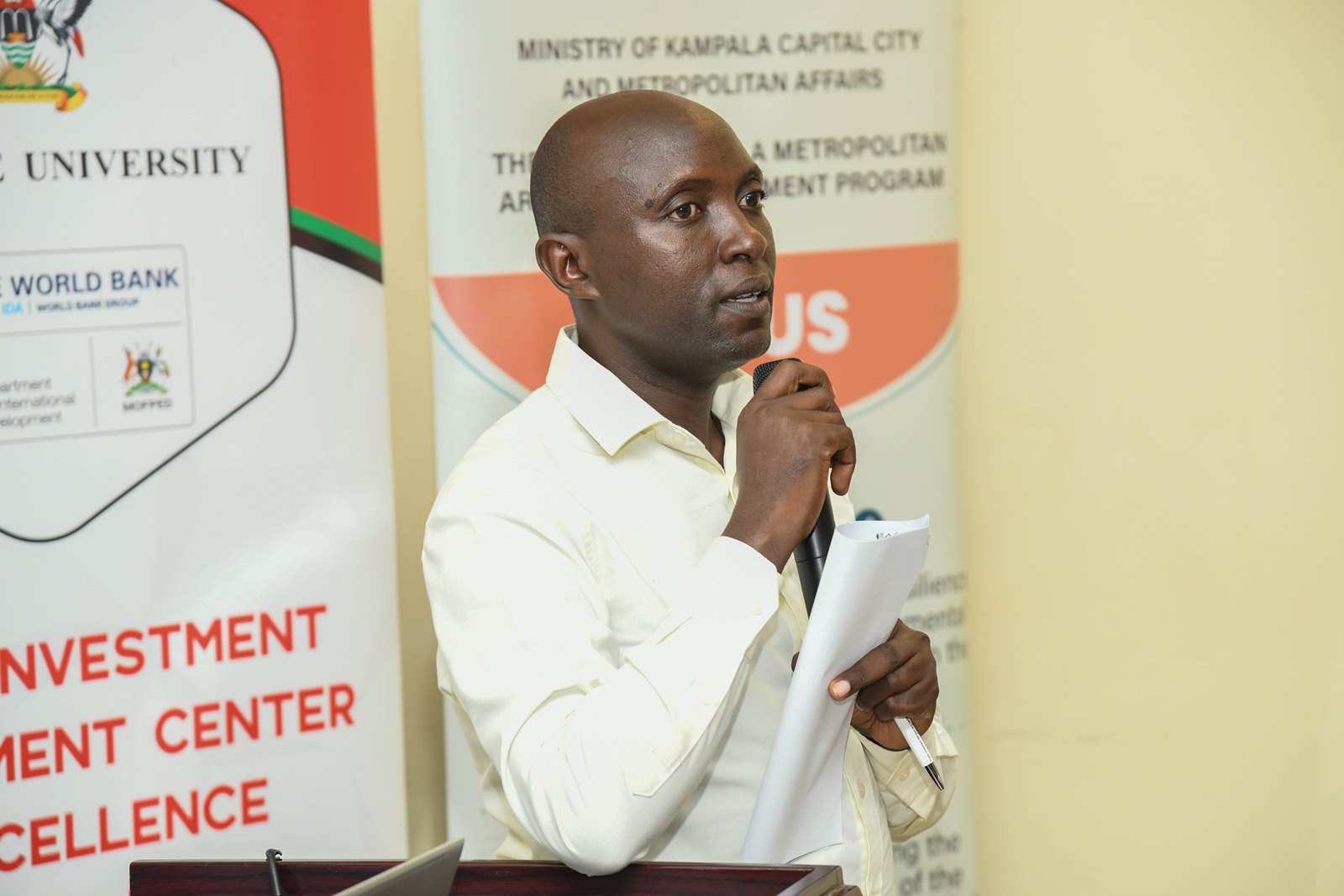
He reiterated that the training is part of a broader strategy to institutionalize environmental and social safeguards within Uganda’s public investment management systems. As the second cohort embarks on the four-day programme, participants have been urged to not only earn certificates but to translate knowledge into action, ensuring safer, more sustainable infrastructure development across the Greater Kampala Metropolitan Area and beyond.
Business & Management
PIM Centre Awards Certificates to MoKCC&MA Officers after Safeguards Training
Published
6 days agoon
February 13, 2026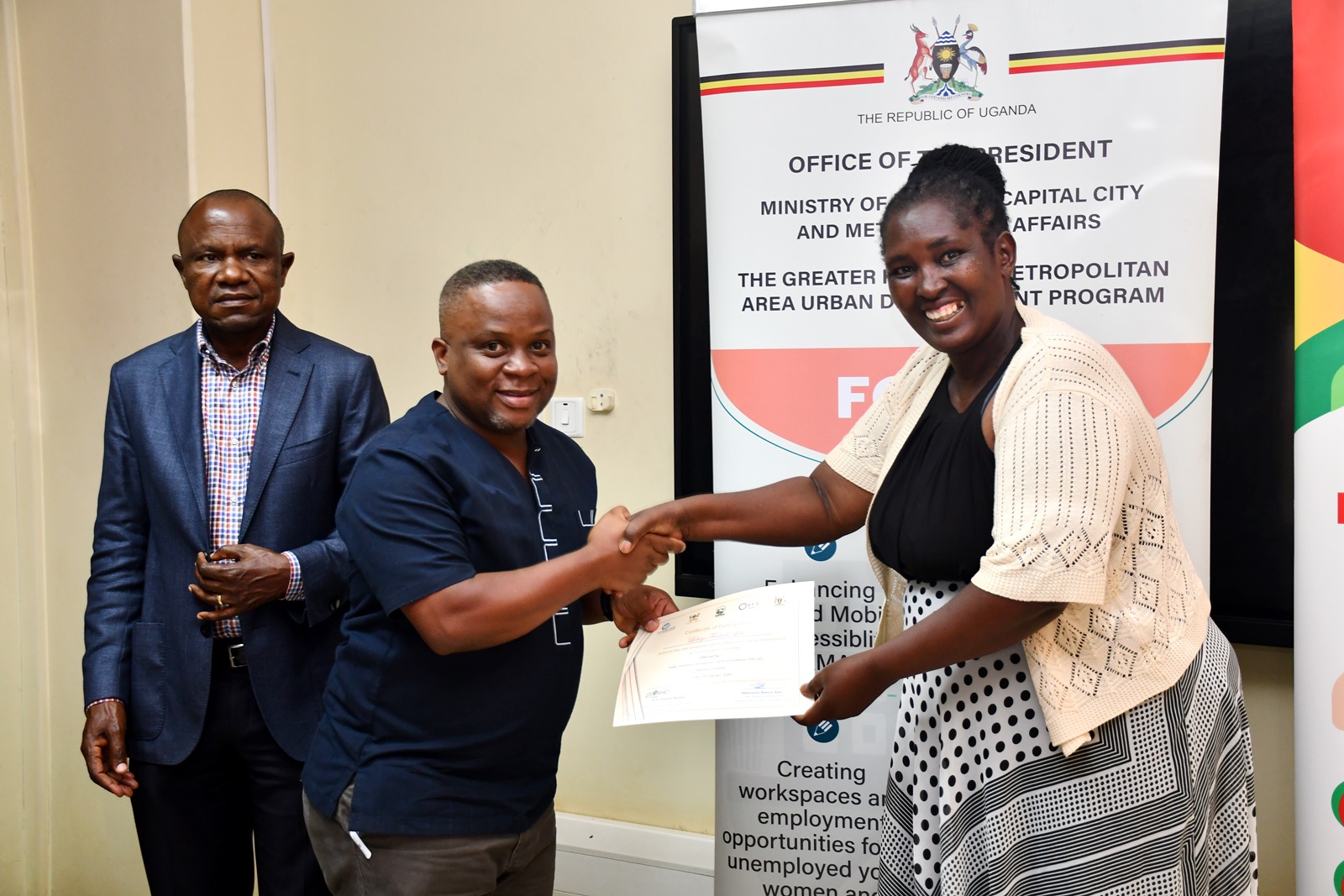
The Makerere University Public Investment Management (PIM) Centre of Excellence has awarded certificates to over 30 officers from the Ministry of Kampala Capital City and Metropolitan Affairs (MoKCC&MA) following the successful completion of a four-day training on Managing Environmental and Social Safeguards in the Procurement Cycle.
The certificate award ceremony, held on February 13, 2026 was presided over by the Under Secretary of MoKCC&MA, Ms. Monica Edemachu Ejua, and attended by university leaders, facilitators, and development partners.
Building Sustainable Procurement Systems
Delivering remarks on behalf of the Principal of the College of Business and Management Sciences (CoBAMS), Prof. Eria Hisali congratulated the participants for pioneering the programme and reaffirmed the PIM Centre’s commitment to strengthening public investment management across the entire project cycle.
Prof. Hisali traced the origins of the PIM Centre to the 2020/2021 financial year, when it was established with initial support from the British Government under a World Bank trust fund. He explained that the Centre was created to equip public sector officials with skills to assess the financial and economic viability of public investment projects.
“We started by focusing on whether projects make financial and economic sense. But public investment management goes beyond feasibility. It includes procurement, monitoring and evaluation, and sustainability considerations,” he noted.
He emphasized that procurement professionals serve as critical gatekeepers in ensuring value for money in public projects. However, he added that modern procurement must go beyond cost considerations to integrate environmental and social sustainability.
“This training marks an important step in mainstreaming sustainability issues into procurement processes,” Prof. Hisali said.
First Cohort of a World Bank-Initiated Programme
Dr. Jude Mugarura, the Lead Trainer, highlighted that development of the training module began three years ago at the initiative of the World Bank. The programme brought together experts from multiple institutions and disciplines, including three colleges at Makerere University—CoBAMS, the College of Agricultural and Environmental Sciences, and the College of Humanities and Social Sciences—working under the PIM Centre of Excellence.
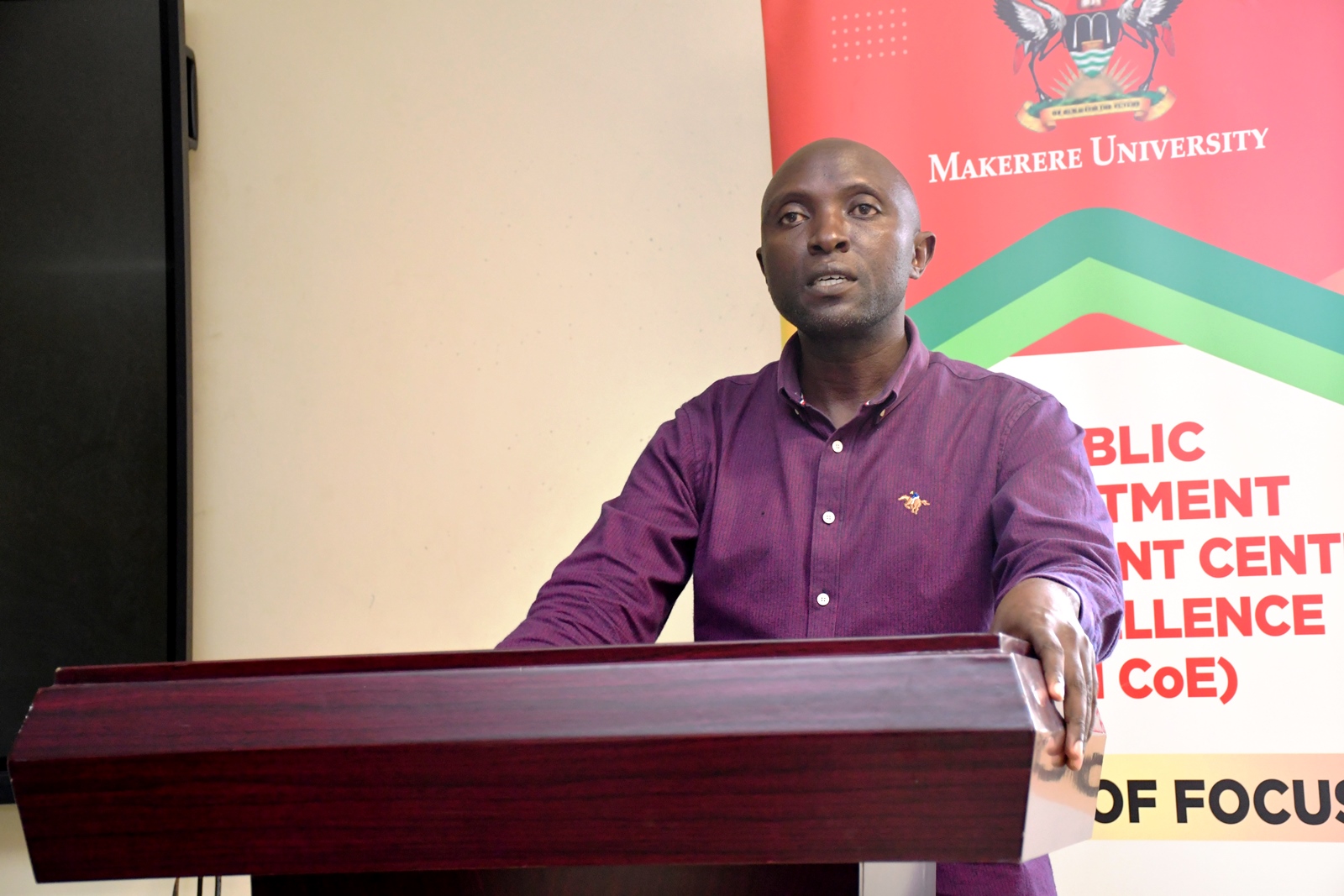
Facilitators also included experts from the Public Procurement and Disposal of Public Assets Authority (PPDA), corporate practitioners, and specialists from the World Bank.
Dr. Mugarura noted that the MoKCC&MA officers formed the first cohort to receive the training, positioning them at the forefront of integrating environmental and social safeguards into procurement practices.
“We appreciate the World Bank for coordinating the development of these materials and supporting the training. We are proud that you are the first group to benefit from this internationally benchmarked programme,” he said.
Call for Practical, Impact-Oriented Training
In her closing remarks, Under Secretary Monica Edemachu Ejua thanked Makerere University and the facilitators for dedicating time and expertise to build the capacity of ministry staff.
She described the training as timely and strategic, noting that it lays a strong foundation for implementation of the Greater Kampala Metropolitan Area Urban Development Programme, as well as other government initiatives.
“This training is not just about one programme. It sets the foundation for sustainability in government projects,” she said.
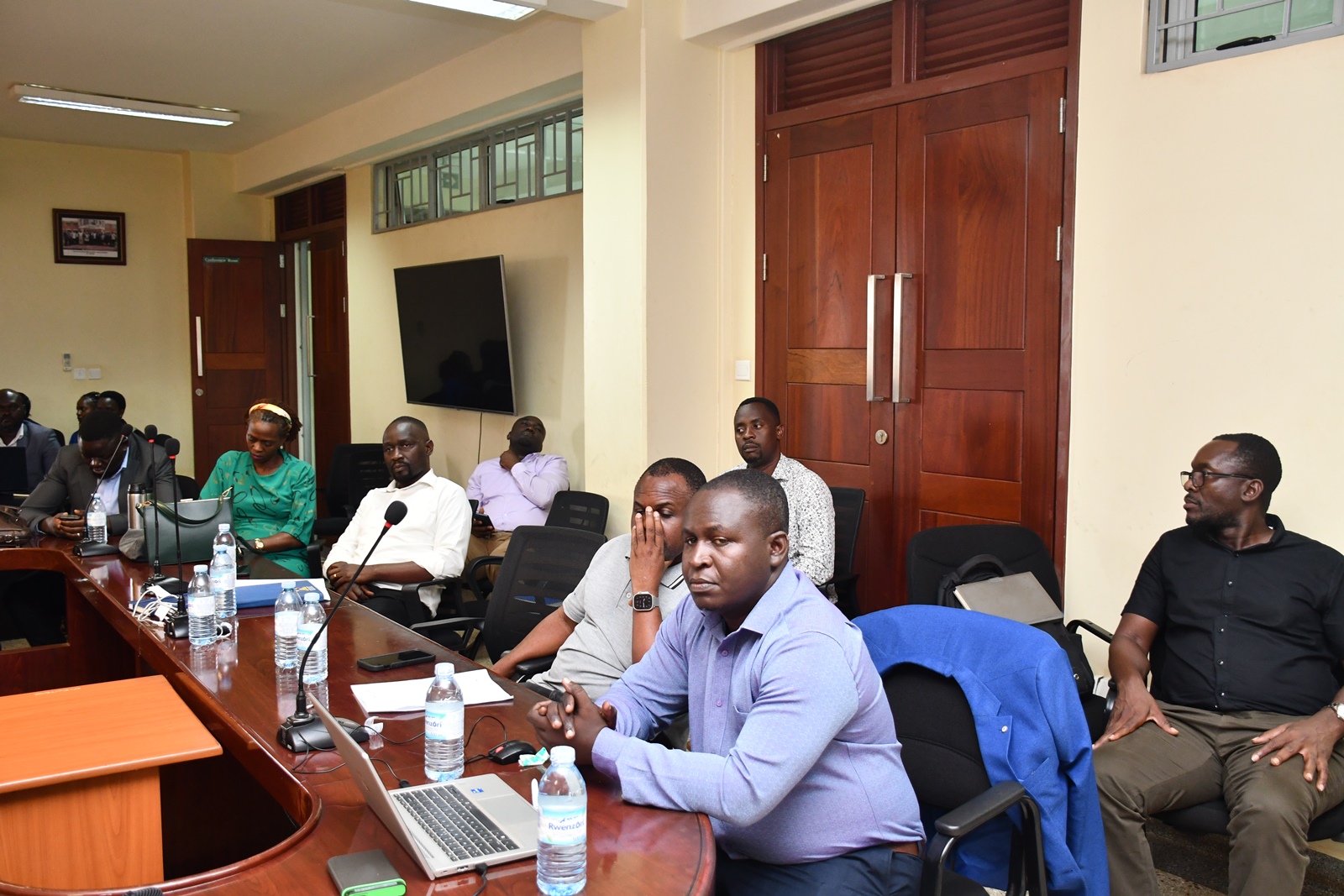
The Under Secretary challenged universities to strengthen practical components in their curricula to better prepare graduates for the demands of public service. She underscored the importance of collaboration between academia and government in addressing national challenges such as waste management, environmental protection, and sustainable urban development.
“Developed countries have worked closely with academia to solve their problems. As government, we must continue partnering with institutions like Makerere to find practical solutions to our challenges,” she emphasized.
She further reminded participants of their responsibility as public officers to promote patriotism, accountability, and sustainability in service delivery.
Expanding the PIM Offering
The training forms part of the PIM Centre’s broader strategy to expand its offerings beyond project appraisal to cover the entire public investment management cycle. Going forward, the Centre plans to deliver modular programmes covering procurement, monitoring and evaluation, project conceptualization, and sustainability integration. The ceremony concluded with the award of certificates to participants and facilitators, marking another milestone in Makerere University’s contribution to strengthening public sector capacity and promoting sustainable public investment in Uganda.
Business & Management
VC Opens Training for MoKCC Officials on Safeguards in Procurement
Published
1 week agoon
February 10, 2026
The Vice Chancellor of Makerere University, Prof. Barnabas Nawangwe, has officially opened a one-week training for Ministry of Kampala Capital City and Metropolitan Affairs (MoKCC&MA) officials on Integrating and Managing Environmental, Social, Health and Safety (ESHS) Safeguards in Procurement.
The training, conducted by the Public Investment Management (PIM) Centre of Excellence, is funded by the World Bank and brings together officials from KCCA, metropolitan and municipal authorities under the Greater Kampala Metropolitan Area (GKMA) programme, alongside officials from central government ministries and agencies.
Opening the training, Prof. Nawangwe emphasized that safeguarding is a critical pillar of sustainable development and accountable public service delivery.
“If we get things wrong in Kampala, we affect the entire country. Everything done in this city must be well planned, socially responsible, and environmentally sound,” Prof. Nawangwe said.
Drawing from his professional background as an architect, the Vice Chancellor underscored the importance of environmental, social, and safety safeguards, noting that failure to address these issues at planning and procurement stages can lead to loss of life, stalled projects, and massive financial waste. He cited international examples where projects were halted or countries faced global pressure due to neglect of environmental and social considerations.

Prof. Nawangwe commended the World Bank for its continued partnership with Makerere University, particularly in supporting the establishment and growth of the PIM Centre of Excellence, which he described as one of the University’s flagship initiatives with visible national impact.
“I see the work of the PIM Centre in government processes, in reports, and even in Development Committee meetings. That is real impact,” he noted, adding that strengthening in-country capacity through Makerere reduces reliance on costly external consultants.
He reaffirmed Makerere University’s commitment to supporting government through research, training, and policy-relevant knowledge, stressing that continuous professional development is essential in a rapidly changing world.
The Under Secretary, Ministry of Kampala Capital City and Metropolitan Affairs, Ms. Monica Edemachu Ejua, welcomed the training, describing it as timely and necessary given the challenges faced during project implementation, particularly in road construction.
Ms. Ejua, revealed that the training was informed by real and painful experiences, including fatal accidents on construction sites, some of which could have been avoided with stronger environmental and social safeguards.
“Environmental, social, and health and safety issues must never be downplayed. These considerations must begin at procurement planning, not at implementation,” she said.
She highlighted that procurement officers, engineers, planners, accountants, and administrators must all understand safeguards, noting that infrastructure development is inherently multidisciplinary.
“Development must be a blessing to communities—not a burden,” she added.
Ms. Ejua praised Makerere University for hosting the training and the World Bank for supporting government efforts to build institutional capacity, adding that learning does not end at graduation.
World Bank: Strong Country Systems Are Key to Development Impact
Presenting on behalf of the World Bank, Ms. Christine Kasedde, a Senior Environmental Specialist, explained that the training is part of a broader effort to strengthen country systems for managing environmental and social risks in development projects.
She noted that while the World Bank has committed over USD 4 billion to projects in Uganda, weak safeguards and capacity constraints have affected implementation and disbursement.

“Environmental and social safeguards are legally binding commitments. When they are not addressed properly, issues escalate to the highest levels of government,” Ms. Kasedde explained.
She outlined how the collaboration with Makerere University has led to the development of several short professional courses across CoBAMS, the College of Agricultural and Environmental Sciences (CAES), and the College of Humanities and Social Sciences (CHUSS). These courses address gaps in social risk management, environmental sustainability, health and safety, climate risk, and procurement.
Ms. Kasedde also revealed that the partnership has culminated in the establishment of an Environmental and Social Sustainability Centre at Makerere University, which will serve as a hub for training, research, advisory services, and independent assessments.
Procurement as a Tool for Sustainable Development
Representing the Public Procurement and Disposal of Public Assets Authority (PPDA), Ms. Mercy Kyoshabire, Director for Procurement and Disposal Capacity Building, emphasized that public procurement accounts for over 60 percent of government expenditure and must therefore be leveraged as a tool for sustainable development.
She reminded participants that environmental, health, and social safeguards have been embedded in standard bidding documents since 2019, urging procurement professionals to integrate sustainability throughout the procurement cycle.
“Sustainability is about the three Ps—People, Profit, and Planet. Procurement decisions made today should not compromise future generations,” she said.
Ms. Kyoshabire reaffirmed PPDA’s commitment to collaboration and capacity building, particularly with centres of excellence such as Makerere University.
A Model of Interdisciplinary Collaboration
The training also drew strong support from the Principal of CAES, represented by Dr. Patrick Byakagaba and, Principal CHUSS, Prof. Helen Nkabala, who emphasized Makerere University’s shift away from siloed approaches toward interdisciplinary collaboration in addressing national development challenges.

Prof. Edward Bbaale, Principal Investigator of the PIM Centre of Excellence, noted that the training responds to critical gaps identified at the pre-investment and procurement stages of public projects, particularly as Uganda pursues an ambitious growth agenda amid climate and social risks. Dr. John Sseruyange, the manager of PIM Centre of Excellence said, the week-long training is expected to strengthen the capacity of KCCA and GKMA implementing entities to integrate and manage environmental, social, health, and safety safeguards across the procurement and project implementation cycle, ultimately improving service delivery and protecting communities.
Trending
-

 Agriculture & Environment2 weeks ago
Agriculture & Environment2 weeks agoFrom Adversity to Excellence: The Inspiring Journey of Makerere’s Best Science Student, Esther Ziribaggwa
-

 General1 week ago
General1 week agoAptitude Exam (Paper 1) Results for the Mature Age Entry Scheme 2026/2027
-

 Health2 weeks ago
Health2 weeks agoDr. Samalie Namukose and the Quiet Work of Making Nutrition Count
-

 Research2 weeks ago
Research2 weeks agoCall for PhD Student Fellowships under H-DATA
-

 Health2 weeks ago
Health2 weeks agoHow Jimmy Osuret Turned Childhood Trauma into Evidence for Safer School Crossings
